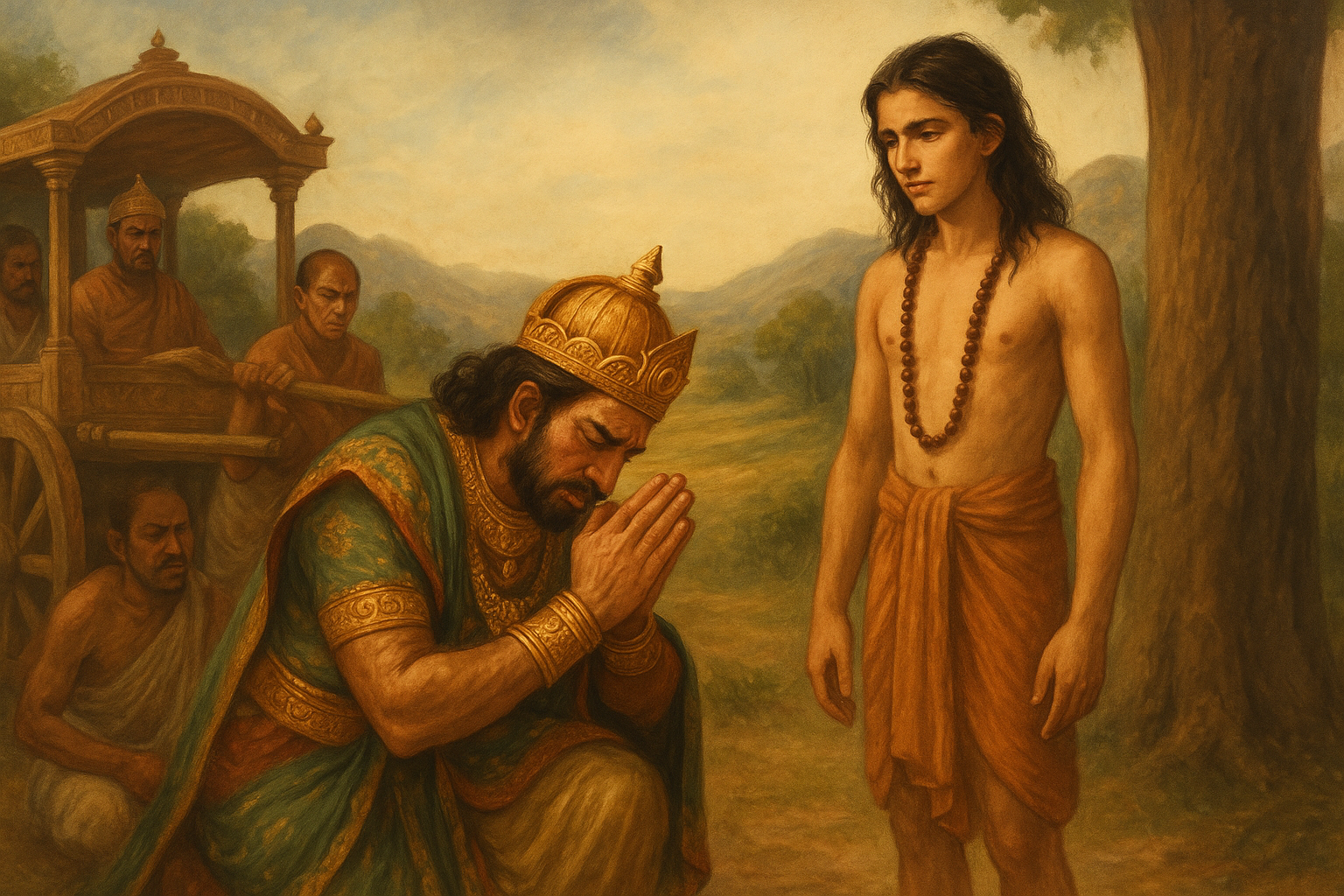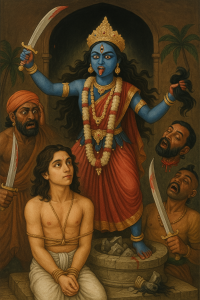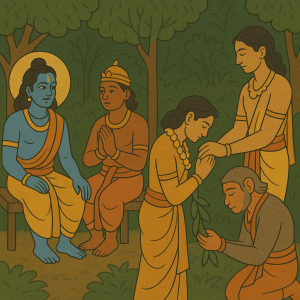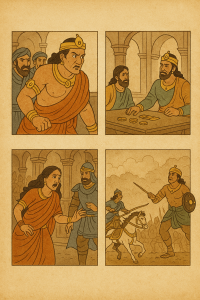Based on Śrīmad-Bhāgavatam Canto 5, Chapter 10–12
A Regal Slip
King Rahūgaṇa, the sovereign of the kingdom of Sauvīra, was well-versed in scriptures and appeared to follow the path of dharma. However, like a golden pot with a hidden crack, beneath his polished exterior, pride lingered—a subtle ego born from royal prestige and a sense of superiority over others.
One day, as part of his journey to meet the sage Kapila, King Rahūgaṇa traveled in a palanquin borne by servants. Among them was a strange-looking man—Jaḍa Bharata—whose body appeared unkempt and whose behavior resembled that of a dullard. In truth, Jaḍa Bharata was a fully self-realized soul, a great paramahaṁsa devotee of Lord Viṣṇu who outwardly behaved like a madman to protect his spiritual absorption from worldly distractions.
As the palanquin swayed unevenly, the king became irritated. “Why are you not carrying properly? Are you tired or just foolish?” he snapped.
He did not realize that he had just directed harsh, mocking words toward a pure Vaiṣṇava.
The Fire of Vaiṣṇava-aparādha
In that one careless moment, the king unknowingly trampled the most sacred ground—he offended a servant of the Lord. The offense, though subtle, was spiritually disastrous.
The Caitanya-caritāmṛta compares such offenses to a mad elephant:
“If the creeper of devotion is trampled by the mad elephant of Vaiṣṇava-aparādha, all one’s spiritual progress is ruined.”
(Madhya-līlā 19.156)
Despite having previously cultivated bhakti, the king suddenly felt dry. His chanting lost taste. Worship became a duty, not a delight. The nectar of the Holy Name, once sweet as honey, now felt like dust in his mouth. The joy of reading scriptures disappeared. It was as if the heart had gone deaf to divine melody.
The Thunder of Wisdom
Jaḍa Bharata, though tolerant and humble, could not allow the offense to stand unaddressed—not for his own sake, but to teach the king and all living beings the gravity of offending a saint.
In a deep and composed voice, Jaḍa Bharata revealed profound spiritual truths: “You think you are the king, and I the servant. You see me as a body. But you are not this kingly form, and I am not this disheveled figure. We are both ātmā—eternal spirit souls. You ride high in ignorance.”
His words struck the king like thunder. For the first time, Rahūgaṇa saw his own heart—tainted by arrogance and illusion.
The King’s Repentance
Overwhelmed with remorse, King Rahūgaṇa immediately dismounted and fell flat at Jaḍa Bharata’s feet, bathing them with tears. His golden crown, symbol of temporal power, now lay in the dust at the feet of a spiritually crowned ascetic.
He said with folded hands, “Please forgive me. I was blind. I see now. Your mercy has shattered the veil.”
That act of humility—bowing before a devotee he had scorned—was like watering the withered creeper of bhakti. His lost connection with the Divine was instantly revived. His chanting became sweet again. His heart softened. His pride dissolved.
Restoration of Devotional Life
Rahūgaṇa then walked beside Jaḍa Bharata—not as a king beside a servant, but as a humble seeker beside a true spiritual master. He begged to hear more, and Jaḍa Bharata poured into his ears the nectar of self-realization.
The offense was forgiven, and the king’s bhakti, once trampled by pride, bloomed again with sincerity and surrender.
Lessons to Carry in the Heart
- Never judge a devotee by external appearance. Jaḍa Bharata seemed mad, but he was a mahā-bhāgavata, a topmost Vaiṣṇava.
- Spiritual pride is subtle but deadly. Even a devotee on the path can fall if pride is not surrendered.
- Offending a devotee blocks all progress. The sweetness of devotion dries up instantly when one commits Vaiṣṇava-aparādha.
- Humility is the cure. Sincere repentance, begging forgiveness, and glorifying the devotee opens the heart once more to bhakti-rasa.
- Devotees are the gateway to the Lord. To hurt them is to close the door of grace; to honor them is to flood the soul with divine light.
From the Source
Śrīmad-Bhāgavatam Canto 5, Chapters 10–12
Caitanya-caritāmṛta, Madhya-līlā 19.156



